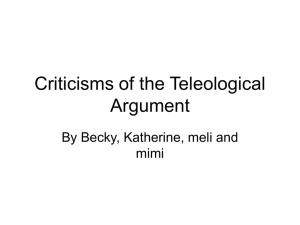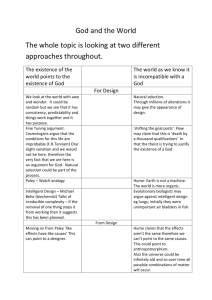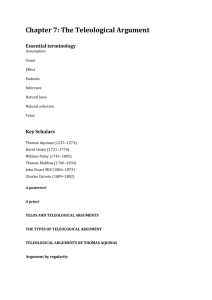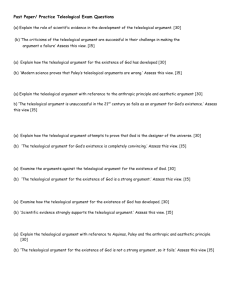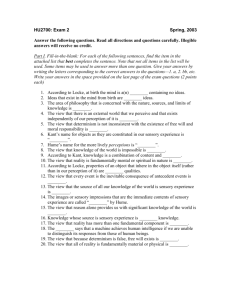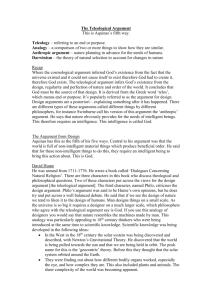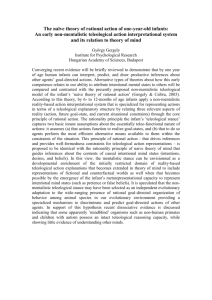Proofs 1 - Philosophy Online
advertisement
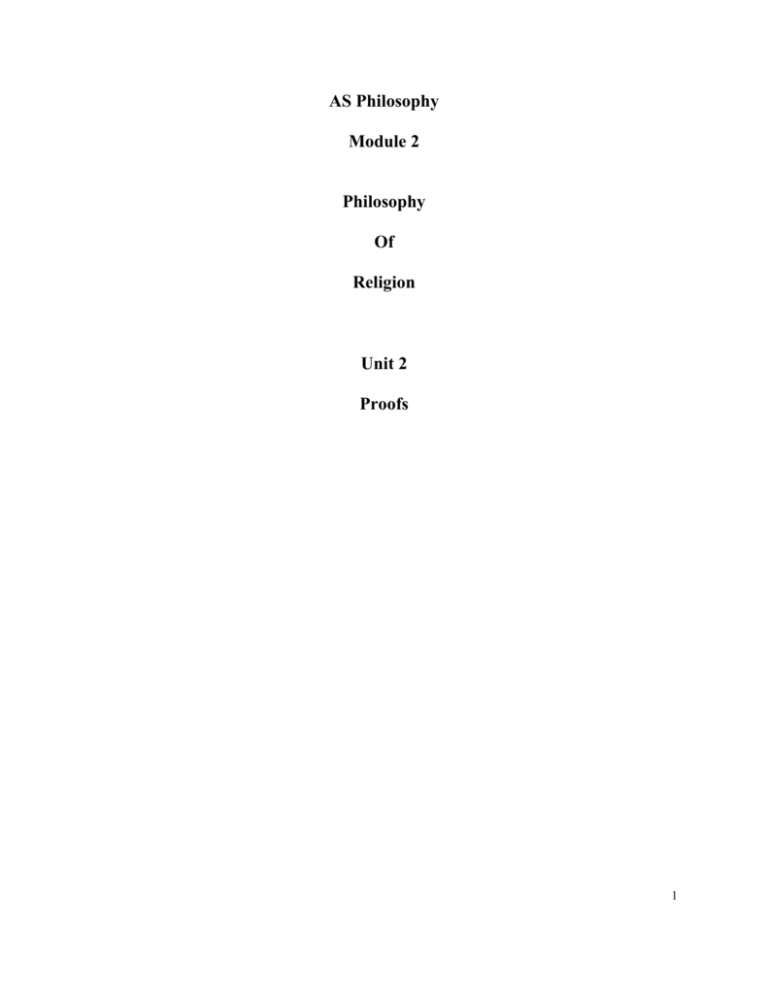
AS Philosophy Module 2 Philosophy Of Religion Unit 2 Proofs 1 Proofs for the Existence of God Introduction Despite the belief that some hold concerning attitudinal belief (value judgements) many religious believers still view religion as a matter of factual belief. For these people, the so-called proofs of God's existence are an important attempt to establish the actual existence of a divine being. The following section discusses the main arguments that have been used throughout history. The Teleological Argument Summary The teleological argument (from the Greek telos meaning 'end' or 'purpose') is also known as the design argument and is based upon examination of the nature of the world. The main thrust of the argument is therefore that the world is too complex and well ordered to have been produced by chance or random change. This being so, it is argued that God is the only being responsible. History The argument is perhaps most well known in the form put forward by William Paley (17431805) in his book Natural Theology: Or Evidences of the Existence and attributes of the Deity Collected from the Appearances of Nature (1802). In the book, Paley compares the world to a watch, suggesting that its intricate design and order presupposes a designer - a watchmaker. This approach is known as Natural Theology in as much as it argues for the existence and nature of God from nature and natural facts. Discussion The Teleological argument rests on two assumptions: (a) that the world appears to have been created or designed (b) that this fact tells us something about the nature of the creator or designer Setting aside part (a) for the moment, what do you think about the second assumption? Think of examples of designed objects and try to decide what we can know about them simply from the object itself. 2 Hume's Criticisms However, many philosophers have challenged this idea, most notably David Hume (1711-76) in his Dialogues Concerning Natural Religion. The main thrust of his argument springs from his analysis of cause and effect and his conclusion that our knowledge of such things is based solely on habit. From Hume's point of view, when we see one thing cause another our knowledge of that experience is based simply on that process of observation. So, when we see one ball hit another we can only base our knowledge of what the reaction is on seeing it happen. The important consequence of this is that we cannot know the nature of any cause apart from observation. Therefore, certainty - from Hume's point of view - is based on how many times something has happened (how probable it is to reoccur). His objections may be summarised as follows: 1. Even if the world were designed, there is no need to suppose either a single or a wholly good creator - it may have been the result of a committee or even an incompetent designer. The existence of evil in the world as well as certain defects also suggest that such a designer could be far less than perfect. 2. Since we only have one universe to judge by, it may be that they occur naturally and do not require design. 3. It is far from logically impossible that chance was responsible for the way the universe is. Kant's Criticisms Immanuel Kant (1724-1776) was influenced by Hume's scepticism regarding cause and effect. Since this view says that our knowledge of the world comes from our mind interacting with it through observation, Kant concluded that conclusions which go beyond observation are invalid. Therefore, such arguments as the Teleological and Cosmological arguments do not hold up because they go beyond space and time. In other words, we usually gain knowledge of cause and effect through observing things within the world. For instance, a ball hits a bat and we observe the trajectory of the ball. However, if the effect is the whole world we cannot have any knowledge of the cause - in this case, God. Creationism Creationism is basically the view that the story of creation as depicted in the Bible’s book of Genesis is generally true. However, there are different brands of creationism, ranging from the fundamentalist view that the world was created in 7 days, to the less literal view that God created each species in its final state. 3 The fundamentalist view is very difficult to hold given the amount of geological evidence there is to suggest the gradual formation of the earth over millennia. However, the opposal of Darwin's theory of evolution is still current among religious believers - notably Jehovah's Witnesses - and tend to concentrate on the "missing link" problem. This view considers that species did not evolve but were created in their final form. Exercise What do you think might be some of the problems for the Creationist theory? List what you think are the main ones. 4 Darwin Charles Darwin (1809-1882), although not the first to propose the theory of evolution, first put forward a comprehensive theoretical explanation for it in his The Origin of Species (1858). Based on his study of species in their own habit, Darwin proposed that similarities between species could be explained through a common heredity - that is, that they both shared a common ancestor. The way this works, according to Darwin, is through what he called Adaptation, whereby a certain species would change according to the environmental conditions. Once this happens, the environment also causes the species that is fittest - or best suited to the conditions - to survive. This theory is best known as Natural Selection or sometimes as survival of the fittest. The consequences of this view for the teleological argument can be summarised in four main points: 1. The Separate Creation of Species: Because Darwinism argued that all species descended from a common ancestor this contradicted the biblical view that each species was created independently by God. 2. The Instant Creation of the World: The biblical account portrays God as creating the world in 7 days, after which nothing changes. However, the evolutionary perspective views things changing and evolving over millions of years. 3. The Goodness of God: The bible views the world as created by God as an expression of His goodness. However, Natural Selection seems to suggest the struggle of opposing forces for dominance. 4. The Nature of Man: If man was made in God's likeness it could not also be possible that he evolved from apes. This view makes man no different from the other animals. Homework. With the publication of The Origin of Species (1858), Charles Darwin (1802-1892) argued for "natural selection" as an alternative process to that of divine design. If this explanation is more likely than a theistic one, does that make the teleological argument redundant? Suggest pros and cons for each view. 5
